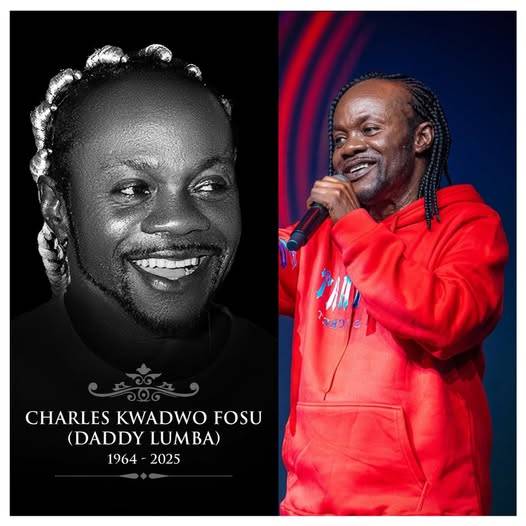Early Life and Background
Lumba began singing in the local church choir at an early
age. He attended Juaben Senior High School, where his passion for music
intensified. It was in secondary school that he formed a group known as the
Lumba Brothers—a name that would eventually become legendary in Ghanaian music.
Struggles and Migration to Germany
In the early 1980s, after high school, Lumba traveled to
Germany to join his mother, who had migrated earlier. The move to Europe was
challenging. As a young immigrant, he worked menial jobs including cleaning and
factory work to survive, all while dreaming of pursuing a music career.
In Hamburg, he met Nana Acheampong, another Ghanaian
musician, and they revived the Lumba Brothers. With borrowed studio time and
savings from his odd jobs, Daddy Lumba managed to record his debut album.
Breakthrough: The Birth of a Legend
In 1989, Daddy Lumba and Nana Acheampong released their
first collaborative album titled “Yɛɛyɛ Aka Akwantuo Mu.” It was a commercial
success and introduced Ghanaians to a new style of highlife that blended
traditional rhythms with Western instrumentation and smooth vocal harmonies.
This album was the turning point in Lumba’s career. Shortly
afterward, he branched out as a solo artist and began an unprecedented musical
journey that would span over three decades.
Music Career and Evolution
Over the years, Daddy Lumba released more than 30 albums, becoming the most prolific and commercially successful highlife artist in Ghanaian history. His music evolved from gospel-infused ballads to danceable highlife hits, romantic serenades, and socially conscious anthems.
Key Albums:
- Yɛɛyɛ Aka Akwantuo Mu (1989)
- Obi Ate Me So Buo (1990)
- Playboy (1995)
- Sika Asem (1996)
- Aben Wo Aha (1998)
- Awosuo (2001)
- Poison (2003)
- Give Peace a Chance (2007)
- Sika (2015)
- Nana Is A Legend (2022)
Notable Songs:
- Theresa
- Aben Wo Aha
- Yentie Obiaa
- Ofon Na Ɛdi Asɛm Fo
- Sika Asem
- Ankwanoma
- Makra Mo
- Ɛbi Se Ɛnni
Musical Style and Themes
Daddy Lumba’s versatility was unmatched. He could sing deep,
soul-searching gospel like “Makra Mo,” then switch effortlessly to flirtatious
love songs like “Playboy.” His style was a blend of:
- Highlife (traditional and modern)
- Gospel
- Afro-pop
- Romantic ballads
- Social commentary
His lyrics addressed themes such as:
- Love and heartbreak
- Betrayal and loyalty
- Poverty and ambition
- Religious faith
- Political satire and national identity
He was also known for his bold fashion sense: permed hair,
flashy suits, and gold jewelry. He was a trendsetter not just in sound, but
also in style.
Collaborations and Mentorship
Lumba played a major role in mentoring and promoting young talent.
One of his most famous protégés was Ofori Amponsah, with whom he released the
joint album “Woho Kyere” in 1999.
He also collaborated with:
- Nana Acheampong
- Great Ampong
- Kojo Antwi (mutual musical respect)
- Borax
- Bisa Kdei
Awards and Recognition
Daddy Lumba received countless awards over his career:
- Ghana Music Awards (Multiple wins)
- Lifetime Achievement Award by MUSIGA and other music bodies
- National Honors for contributions to arts and culture
- Top-selling artist of the 1990s and early 2000s
- Posthumous recognitions, including Billboard trends and streaming records
In 2022, he was honored with the “Legendary Musician of the
Century” award by the Ghana Creative Arts Council.
Personal Life and Character
Despite his fame, Daddy Lumba was deeply private. He married
a German-based Ghanaian woman and had several children, though he kept family
matters away from the media spotlight.
He was known to be:
- Deeply spiritual
- Generous but discreet
- Introspective and sometimes controversial
- Unapologetically authentic in his music and lifestyle
In his later years, he battled health issues, which limited
his public appearances but never dimmed his musical legacy.
Death and National Mourning
On July 26, 2025, Daddy Lumba passed away at The Bank Hospital
in Accra after a brief illness. The announcement was made by his family through
their legal representatives.
The nation was plunged into mourning. Thousands gathered for
candlelight vigils, tribute concerts, and church services.
Notable reactions:
- President Mahama: “His music was the soundtrack of our lives.”
- Former President Akufo-Addo: “An unmatched national treasure.”
- Vice-President Bawumia: “A genius whose works transcended politics and
generations.”
His music surged on streaming platforms globally. Over 25 of
his songs entered Ghana’s Apple Music Top 100 within 72 hours.
Legacy
Daddy Lumba is widely regarded as the “King of Modern
Highlife.” His contributions helped shape not only the sound but the soul of
Ghanaian music.
His legacy includes:
- A musical catalog spanning four decades
- A fanbase across Africa, Europe, and the diaspora
- Influence on nearly every highlife artist after him
- A bridge between traditional music and modern African pop
Even in death, his songs continue to speak, reminding
Ghanaians and the world of love, pain, faith, and perseverance.
Conclusion
Daddy Lumba’s life was not just a journey through music but
a story of resilience, innovation, and deep emotional connection with his
audience. From the dusty streets of Nsuta to the grandest stages in Ghana and
abroad, he sang his truth and etched it into the heart of a nation.
May his soul rest in perfect peace.




No comments yet
Be the first to share your thoughts!